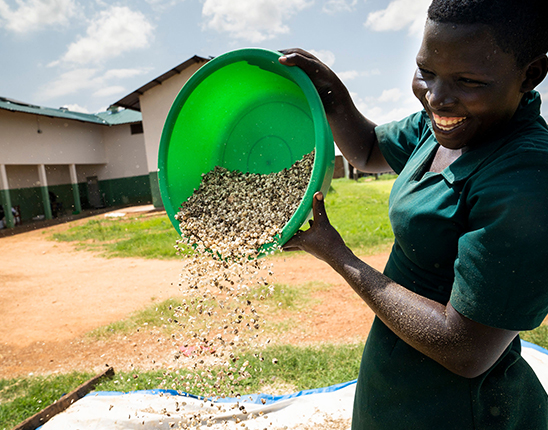In northern Uganda, forests are disappearing.
Climate change, land clearing for agriculture and growing demand for charcoal are wiping out trees and threatening livelihoods. In fact, the rate of deforestation is so devastating that the country could lose all its natural forests in just 40 years. And when forests are destroyed, it’s not an isolated problem: soil becomes degraded, biodiversity disappears, and watersheds suffer.
Ugandan farmers are already feeling the effects of deforestation—they’re struggling to adapt to unpredictable weather patterns. Rain is no longer falling when expected or it’s raining so much that crops simply get washed away. These weather swings can have a ravaging impact on crops that reduce farmers’ ability to support their families.
OUR REGENERATIVE FARM INVESTMENT
In 2014, Lush began investing in regenerative farms: agricultural projects that regenerate degraded land while producing ingredients for our products. In the same year in Uganda, we helped purchase 34 hectares of land, eight of which were a former displaced persons camp.
With each regenerative farm project, we have three common goals:
- Put more trees in the ground
- Put more money in the hands of farmers
- Build an ethical business that can grow ingredients with 100 percent transparency
Joyce separates moringa seeds from their shells in a process called “winnowing”.

Our three farms in northern Uganda are all within two hours of Gulu, an area with limited fair economic opportunities. Communities here are still feeling the effects of more than 20 years of civil war. We’re proud to provide full-time work for 40 employees at the farm and oil seed processing site, which are 100 percent locally managed.
The farm isn’t a typical flat, expansive field covered in a single crop. It’s an agroforesty system; a natural environment that works with nature instead of against it, while still allowing for viable, profitable crops. Agroforestry systems are extremely resilient in the face of rapidly changing weather patterns because they create a microclimate where the trees regulate water and soil moisture, improve soil fertility, and create shelter for shade-loving plants and animals.
Outside the borders of our own farms, we work with 200 partner farmers in the surrounding community to grow ingredients that we use in our cosmetics: sesame, moringa, vanilla and cocoa. These partner farmers are also using agroforestry models. These diverse systems allow farmers to grow food for their families alongside the crops that Lush will buy, creating more food security and biodiversity for their communities.
WHAT WE GROW
Moringa, also known as “the miracle plant”, is incredibly nutritious, fast-growing, drought-resistant, and helps to stabilize degraded soil. It’s been grown in Uganda since the 1950s, but with little market demand, there’s not much incentive to grow it.
By being a guaranteed buyer of moringa at a fair price, Lush has offered farmers incentive to plant this tree while providing a pathway to a strong income. Sesame is grown alongside fruit trees to increase biodiversity, tree cover, and food security.
There are two oilseed presses in our Ugandan processing site, which operate using 100 percent solar energy. They can produce upwards of 550 pounds of moringa and sesame oils in one week. In January 2018, the first batches of moringa and sesame oils from Uganda arrived into our factories and can now be found in Skin Drink Moisturizer and Magical Moringa Beauty Balm .
LOOKING FORWARD
As we continue to grow our regenerative farming projects, we hope to revitalize the land and support communities far beyond the farms that we invest in. And whenever you buy a Lush product, you’re investing in a flourishing future we can all feel good about.

